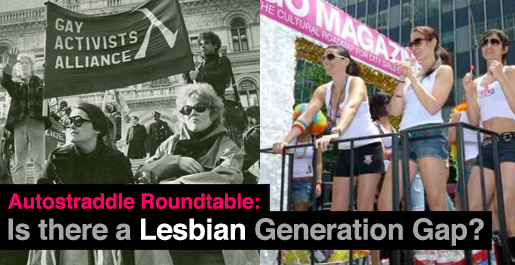
“To many young gay people, the passage of Prop 8 was shocking but not alarming,” writes Mark Harris in New York Magazine‘s “The Gay Generation Gap,” published two weeks ago in the magazine’s special Pride Week Section. Harris continues: “It has jolted them into action, but one suspects it’s out of a Milk-fed belief that identity-politics activism can be ennobling and cool.”
Ouch! One suspects that one is being unfair to us! One suspects that if we’ve managed to make activism “cool,” then that’s a BIG SCORE! — but wait. Before you get too excited (as we did), there’s no need to be offended ’cause this shit ain’t about you, woman! There are no ladies addressed in Mark Harris’s article, or actually at all in the Gay Pride section of this issue. To be fair, the issue is dedicated to the 40th anniversary of the Stonewall Riots (the first time gays fought back with a vengence), and Stonewall was a gay men’s “Inn” frequented by only a handful of women. But as we seem encouraged to think of Stonewall as the turning point for the whole GL(and later, BTQ) movement, the lesbian exclusion from this article is not necessarily unfair, but certainly somewhat salty and definitely worth noting.
I mean, back in 1969, few women had the economic mobility or free time (what with our socially mandated husbands & children and such) to support/frequent a place like Stonewall (like many gay bars at the time, however, Stonewall was actually owned and protected by the Mafia). Furthermore, women were then (as they are now) often financially codependent on their husbands or locked in to child caretaking and simply unable to duck out to the bar. Alternatively, perhaps the intimacy of female friendships offered more space to sneak under the radar with secret affairs moreso than men could.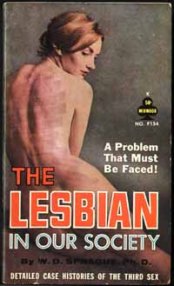
So I don’t say this to diminish the plight of gay men who face, and have faced, their own incredible obstacles to freedom, I say this to make clear that yes, Stonewall was our fight too: we weren’t absent ’cause it wasn’t our fight. We were absent because we were oppressed by the motherfrackin’ patriarchy, which makes it extra depressing to be kicked out of this freakin’ article. Srsly, The Equal Rights Amendment didn’t even pass through congress until 1972. In 1976, Nebraska became the first state to make it illegal for a man to rape his wife.
“Gay power! Isn’t that great!… It’s about time we did something to assert ourselves. You know, the guys there were so beautiful—they’ve lost that wounded look that fags all had 10 years ago”. (Allen Ginsberg, 1971)
But surely if we’re lumped in [read: lightly placated] with gay men by allegedly inclusive magazines, TV channels, advertisers and [much to our COO’s display] marketing reports, we could’ve gotten our standard two or three lines in this article? Where was Ariel Levy, the only lesbian journalist in the world? [Oh! Norah Vincent! I forgot!] Lesbians have felt shafted by the gay rights movement and the feminist movement since both groups began moving at all and because we at Autostraddle (perhaps naively) believe it doesn’t have to be that way, and there are at least 40 people reading this who might care, we decided to ask ourselves: Is there a Lesbian Generation Gap?
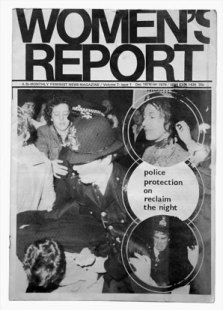 First, you should read Harris’s article, in which many things happen including his litany of the most unfair accusations hurled between the youngsters and the oldies: the young ones are “shallow,” “silly,” they “reek of entitlement,” are “sexually careless” and “haven’t had to work for anything and therefore aren’t interested in anything that takes work” and the old ones “gas on about AIDS the way our parents or grandparents couldn’t stop talking about World War II,” and are “grim, prim, strident, self-ghettoizing, doctrinaire bores who think that if you’re not gloomy, you’re not worth taking seriously.”
First, you should read Harris’s article, in which many things happen including his litany of the most unfair accusations hurled between the youngsters and the oldies: the young ones are “shallow,” “silly,” they “reek of entitlement,” are “sexually careless” and “haven’t had to work for anything and therefore aren’t interested in anything that takes work” and the old ones “gas on about AIDS the way our parents or grandparents couldn’t stop talking about World War II,” and are “grim, prim, strident, self-ghettoizing, doctrinaire bores who think that if you’re not gloomy, you’re not worth taking seriously.”
If young gay men are ignorant about the AIDS crisis, are young gay women ignorant about the Lavender Menace or the Lesbian Sex Wars or the Suicidal/Homicidal Lesbian Archetype or Compulsory Heterosexuality or really exactly how recently feminism opened up a number of doors? Or anything? Are we too ignorant to write this?
Within the incredibly limited age rage of Team Autostraddle (early to late 20s), our experiences growing up vary dramatically mostly due to the proliferation of the internet and the great achievements of our lord mother Ellen DeGeneres. JK. Anyhow, when it comes to this kind of stuff I think the Team is mostly in the same generation.
Anyhow, today we also bring not one, not two, but THREE SPECIAL GUEST ROUNDTABLE PARTICIPANTS:
 1. Rising Star and BFFOA (Best Friend Forev of Autostraddle) Haviland Stillwell, once quoted as describing her “type” as “whomever’s on the cover of More magazine.”
1. Rising Star and BFFOA (Best Friend Forev of Autostraddle) Haviland Stillwell, once quoted as describing her “type” as “whomever’s on the cover of More magazine.”
2. FOA (Friend of Autostraddle) Grace Chu who you know as lovable blogger Grace The Spot and smash hit blogger at number one lesbian website AfterEllen.com.
3. MOR (Mother of Riese), otherwise known as Riese’s Mom, who is 24 years older than Riese because that’s when she birthed Riese, and is therefore speaking from the other side of the generational divide … if there is one!!!
Here we go!
(-Editor Riese)
![]()
Laneia (28):
My first number one feeling about this article was duh. Is there a generation gap between people over the age of 50 and people under the age of 50? Um, of course there is. As I read further, I realized that my second number one feeling was, does Mark Harris actually know anyone in the 18 – 35 bracket? Because there are quite a few sweeping generalizations in this article, as well as one very notable omission, that lead me to believe he might need my input.
For the most part, younger generations will always think they knew The Answer—being naive and full of big plans and ideas and ANSWERS is how we validate this mountain of new responsibilities we’ve suddenly been handed. We must have the answers because, after all, we’re in charge of our own rent, bank account, career, debt, relationships—surely we know what we’re doing, right? Actually, I’d say we’re running on 50% naive optimism and 50% gripping fear. But, hey, whatever works.
While Harris waxes nostalgic over a secret gay language that’s dying off and a lack of staged protests, I’d like to tell him what really infuriates me about the gay community at large: the fact that practically every article about gays is an article primarily about MEN. The fact that almost every major and minor gay publication is written for and by MEN, wherein even the bulk of the advertising is aimed at MEN.
The author’s idea that young gay people aren’t shocked by the political and social injustices that we all face is ludicrous. Prop 8 was one of the most shocking things, politically speaking, that I’ve ever seen. We weren’t “jolted into action by a Milk-fed belief that identity politics activism can be ennobling and cool,” but because this is our future we’re talking about. We want exactly what you want, Mark: equal rights. Maybe we’re not screaming with homemade signs in our hands, but we are fighting.
Harris also makes the generalization that young gays are uninterested in the history of the gay rights movement. This statement is so insulting and presumptuous, I’m struggling to validate it with a response. You’re wrong, Mark.
With regard to the article’s glaring omission of every gay woman on the planet: what the hell? There wasn’t even a mention of the fact that he wasn’t going to mention us. I can understand if the author feels he doesn’t have much insight into the lesbian world, but I think he could’ve at least stated as much in his piece. Then again, maybe women don’t have as pronounced of a divide between us as men do. Speaking for myself, I’m always looking to older generations for inspiration, knowledge and friendship.
While Harris waxes nostalgic over a secret gay language that’s dying off and a lack of staged protests, I’d like to tell him what really infuriates me about the gay community at large: the gender gap. The fact that practically every article about gays is an article primarily about MEN. The fact that almost every major and minor gay publication is written for and by MEN, wherein even the bulk of the advertising is aimed at MEN. The fact that gay men act as though only they are entilted to outrage and that historical oppression is viewed strictly through a male lens. Harris and his older friends feel invisible to their younger counterparts? We feel invisible to EVERYONE.
Play him off, Whitney Houston.
![]()
Robin (28):
After spending a few years working in various fields gay media, I do think that while a generation gap between older gays AND lesbians and their younger counterparts does exist, it is quite varied and complex. I always felt a conflict between the apologetic & careful way some of the older lesbians wanted to present gay conflict. They were afraid to offend and grateful for small changes, and I wanted more! However, I believe that there will always be some generational differences within any society and community and these definitely do not apply to everyone.
Haviland:
I absolutely believe there is a lesbian generation gap, and it widens through lack of understanding and respect. I think it’s in our best interest as a community to do everything we can to narrow that gap.
The first step is to recognize the extraordinary contributions of every queer person who’s been “out” for any extended period of time — just by virtue of the fact that being open about themselves was a helluva lot harder in the past than it is now.
Obvs, there are still problems, but the mere existence of the older generations has given us what freedoms we do have now. No, we don’t have full equal rights, but we do need to understand & appreciate our history and what we do hve.
“We can’t be arrogant; Ellen’s coming out was not the beginning of lesbian culture. There were always lesbians in pop culture, but the only people who knew about it were other lesbians. It was discussed in hushed tones. What we have to do as younger women is to fully respect and appreciate what our “elders” have gone through.”
Thanking those who fought and loved before us does not mean we’re acquiescing to the struggles we still have before us. I encourage everyone to really learn about LGBTQ history. Ignorance on any level is where generations create gaps. If you think about it this way, older women are basically forced to get hip to what we’re doing, because “young” culture is where the energy is focused in mainstream media. It’s inescapable. We can’t be arrogant; Ellen’s coming out was not the beginning of lesbian culture. There were always lesbians in pop culture, but the only people who knew about it were other lesbians. It was discussed in hushed tones. What we have to do as younger women is to fully respect and appreciate what our “elders” have gone through (feminism? finances? the butch/femme requirement? AIDS crisis, anyone? etc…), how their existence has helped us, and really thank them and act reverently towards them.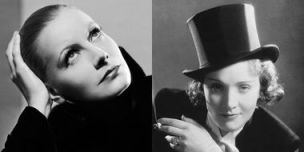
They, of course, must do the same, but like every therapist will tell you, “you can’t change someone else’s behavior; only your own.” (Yes, I just wrote that.) We still have a long way to go, of course, but the bottom line? We have to support each other, first and foremost, and recognize how truly extraordinary we all are, as individuals, yes, and as a community. Narrow the gap and we’re tremendously stronger.
![]()
Crystal (25):
I felt that this article was hard to follow, my poor brain wasn’t able to fully absorb the author’s point and it’s quite possible that I’ve missed it completely. The idea of the ‘gay’ generation gap confuses me and I’ve made a hundred edits to this paragraph to try to articulate why, but it’s tough. There is definitely a generation gap, but I’m not sure about a lesbian generation gap. I’ve been called a narcissist on occassion, been accused of not understanding or respecting what the older generation has done for me – but never by a lesbian. It’s possible that I just don’t know enough of them. But the ones I do know or have run into have never accused me of not understanding their struggle, or resented me for appearing optimistic at a gay rights rally. If they have then it’s possible that I’ve been too self-involved to have noticed. Kids these days…
Grace the Spot:
Well, some of the older lesbians (in urban centers) I know were in the thick of the gay liberation movement and can’t understand why the younger ones – and the ones in less urban areas – seem to be hell bent on “assimilating” and “becoming ordinary.” Liberation is about freedom, they say. I always respond that the institution of marriage is yet another space that should be an option for lesbians, and freedom is all about increasing options for all, even if some of the options may seem a bit un-queer to those who associate “queer” with “radical.” Liberationists can simply opt out if such an option exists, you know.
Liberation is about freedom, they say. I always respond that the institution of marriage is yet another space that should be an option for lesbians, and freedom is all about increasing options for all, even if some of the options may seem a bit un-queer to those who associate “queer” with “radical.”
It is interesting to note that – if you go one generation back from the liberationists – the original lesbian rights organization was the pre-Stonewall Daughters of Bilitis, which was founded in the 1950s by Del Martin and Phyllis Lyon, and their original goal was to convince society that lesbians weren’t weird of immoral or diseased – but they were just like everyone else in society. Gay normalization wasn’t just “made up” in the late 1990s and 2000 you know. Know your history! Martin and Lyon were able to get legally married in California this past year before Martin passed away, and if you didn’t cry or feel a sense of vindication when you saw the ceremony, you’re a cylon, and not one of those human looking ones that can feel – you’re one of those robot-looking centurions and you suck.
Also, I derive a lot of amusement from some millennials who seem to place a premium on arguing about gender labels ad nauseam and then screaming at you when you take a bit of time to catch on or if you have a sneaking suspicion that such esoteric nitpicking is just a form of intellectualizing “ME ME ME ME ME!” In fact, a really fun game to play is “create a non-existent gender label” – it’s similar to a game you can play with hipsters called “create a non-existent indie band,” in which you approach a hipster and ask if he is a fan of [non-existent indie band]. He will either save face by nodding as if the band exists or he will swallow nervously and say that he has never heard of the band, upon which you give him a look of profound disappointment, and he will feel like crawling into the nearest hole to comfort himself by playing obscure French emo on his iPod.
To play “create a non-existent gender label” you approach a label-obsessed queer (“LOQ”) and eventually, the issue of what you identify as will come up. At this point you must proudly announce that you identify as [non-existent gender label]. LOQ will either take you seriously or be ashamed that there is a gender label in existence that she was unaware of. Many chances for playing both of these games can be found in Brooklyn, the borough of “being overly competitive at things that don’t matter.”
![]()
Riese (27):
Yes, there is, but it’s not laced with the animosity Harris describes amongst the gay male community. (Sidenote: I’m unsure why Harris wants to criticize young gays who are politically active. If you’re out there with a sign, um, bravah, there’s really no need for anyone to look at you and think, “ignorance.” If we’ve made activism “cool,” then I think we really have won.)
True enough — although usually I feel gratitude, support and enthusiasm from lesbians of all ages, every now and then I have a conversation with an elder Lesbian who talks to me like I’m a character on The L Word or finds my current objectives naive, which is strange because I have such genuine admiration for pretty much every single lesbian older than me. They always seem shocked that I know as much as I do about the women’s lib movement or lesbian herstory. In these conversations there are things I don’t mention, e.g., bisexuality.
That being said, It’s not entirely unfair to perceive the young’uns (myself included) as Lindsay Lohanized web-enabled Dinah-Shored easy-breezy glam lesbians who don’t appreciate what their elders fought for or to think younger gens take our current freedoms for granted.
But do I think every lesbian is obligated to research lesbian history, as I have? Nope. I think that’s the responsibility of our schools. I’m not comparing our struggle to the struggle of African-Americans in this country, but you’d be hard-pressed to find an American completely unaware of slavery, the trials of the civil rights movement or the hate crimes carried out by KKK. And it’s not just that we’re left out of history lessons, we’re literally censored out of school libraries.
So, aside from dropping that my Mom’s a ‘mo (though I really can’t attribute any of my lezducation to her, having shipped out a few months after she came out when I was 15), the best way to cross this hesitant divide is to show my pebbles of self-education and my willingness & desire to know more; I’m prepared to discuss Virginia & Vita just as I am to dish on LiLo & SamRo. (YEAH I JUST SAID THAT!)
I know more than a lot of my peers and I defo don’t know enough. When women my age say they aren’t feminists I want to hit them on the forehead with a sledgehammer, like how can you not know what that word means.
The primary generation gap I think is the internet – it has become INFINITELY easier to find other lesbos than it was even five or ten years ago when it was entirely possible to spend your life not knowing (that you know) anyone else like you.
But do I think everyone is responsible to research lesbian history? Nope. I think that’s the responsibility of our schools. I’m not comparing our struggle to the struggle of African-Americans in this country, but you’d be hard-pressed to find an American completely unaware of slavery, the trials of the civil rights movement or the KKK. And it’s not just that we’re left out of history lessons, we’re literally censored out of school libraries.
Many women (and this matters to all women, because this is about our ability to tell stories and be visible independent of our relationships to men) don’t know there’s even more than one ‘wave’ of feminism or don’t realize that Ellen’s coming out wasn’t well-received.
On top of that, as Harris points out, the generational divide is something usually reckoned with, initially, at home. We are supposed to fight with our parents on these issues. But because the homos don’t reproduce quite as efficiently as the hets nor is sexuality necessarily passed on, we don’t have the opportunity to work out political & cultural divides within various minority populations with our parents, it can only happen with our peers. With lesbians more down to date older women than anyone else in the history of all time, many of us are educated by our girlfriends rather than by our mothers or our teachers.
With so much of our history hidden or hard to find, it’s really hard for anyone to gauge the difference between stuff we don’t know and stuff that doesn’t exist.
So I think this goes for the gay men targeted in this article as it does for lesbians—don’t get angry at the younger kids for not knowing anything. Get angry at our educational system & at the media & the press for censoring and ignoring our HERSTORY!
Mark Harris says that the elder generations think we’re not angry enough, so I say let’s all be angry together and storm the Wasilla Public Library. Omg I can’t stop thinking about S-Pale today.
Oh and BTW! THANK YOU! (Why is my answer always the most confused and discombobulated of all the answers? ssjgljdsgi)
![]()
Stef (25):
The article focuses mainly on the gay male generation gap, and it IS a little odd that there is no mention of gay women or the struggle thereof… I wonder if it’s because until recently, gay women haven’t been very visible in mainstream culture – it just hasn’t been hip or fashionable or really in the forefront of society. Thankfully, due to a variety of factors (like um, AUTOSTRADDLE obvs), this is beginning to change. As for a generation gap… I don’t know that such a thing really exists, but women generally socialize really differently than men anyway, yeah? I don’t like to make generalized statements about an entire generation; I don’t think that’s fair.
 Brooke (24):
Brooke (24):
I’m going to go with Generation Gaps Are a Given for $500. Lesbian Generation Gap. Based on a limited number of discussions with lesbians of older generations, their primary concern is that we, the younger generation, take the time to educate ourselves about where we came from and the history of the movement.
This makes sense for a number of reasons, e.g., you educate yourself about the past ’cause you don’t want history to repeat itself. I had a lot more to say on this and how we must actively seek out history on our own if we want to learn about it, but then I read what Riese wrote and it was similar, so.
So when you finally identify as a lesbian, you’ll have lost all those years of possible learning, because why would you have even thought to look? And when you finally do, what are your priorities? Probably not history.
So I’d like to comment briefly on what she said regarding the difference between the lesbian generation gap and other generation gaps. Unlike other minority or mainstream groups, lesbians are self identified. Many women don’t realize, or don’t admit to themselves that they’re queer for years, if ever, and even if they do, there isn’t a way to readily identify themselves to others or find others they can identify with. So when you finally identify as whatever, you’ll have lost all those years of possible learning, because why would you have even thought to look? And when you finally do, what are your priorities? Probably not history.
The following is one of a million examples: Say you realize you’re gay at age 24… in a simplified situation all the sudden it’s like “Hey! I’m gay! What’s that mean? How do I tell people? Where the women at?” “Prop 8?? That’s me! WTF??” and you’re likely more focused on figuring out your sexuality and “the now” rather than the past. Not that you won’t get to learning about the past down the road. But it’s all new to you, the past, the present and the future. With most other minority groups, their history is thrust on them from a variety of sources (not necessarily from school as you’ll rarely learn about the history of Hispanics or Asians in America in class) from the day they’re born.
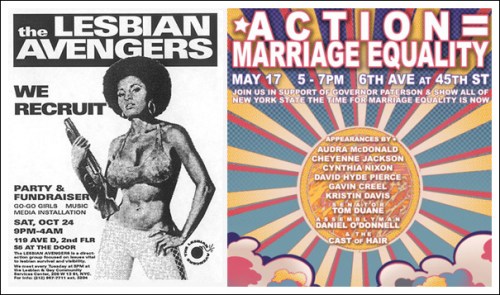
How does this get resolved? You need women, both younger and older, out as role models in the public sphere, bringing the voice of queer women: our past, our present and our future to the mainstream and ourselves.
![]()
Carly (27):
I’m a little tipsy and that article had too many words for me! What I can speak to are my experiences. Certainly, a generation gap exists in all subcultures and subsections of society and lesbians and gays are no different.
I think that there is a generation gap in the LGBT community in general; I was talking about that gay TV network I work for with some eldergays, and they were saying that they loved the documentaries but hated the music shows. I told them that I produced the music shows, and they were extremely apologetic and embarrassed, but I got where they were coming from. I don’t want to generalize and say that our generation is so vastly removed from previous ones but differences certainly exist.
In my experience, most of the older lesbians I have known have had the same ideals, dreams and goals as I have, among them: to have equal rights, to be successful, to be included. Maybe it’s just that I wouldn’t surround myself with anyone who doesn’t agree in those regards, but I’ve actually found older gay men to be less progressive than older lesbians. But that’s just been my experience.
As Laneia said, I think that the more problematic gap that exists in our community gap is between men and women, not between the different generations. Gay women are left out of most articles, studies and conversations about the gay community, and it’s time that someone (cough Autostraddle cough) does something about it.
Riese’s Mom! (51)
When talking about a generation gap the implied assumption is that chronological age is the major determinant of where one generation starts and the other leaves off. Yet my personal experience causes me to question that assumption. I officially came out in my early 40’s, on the tail end of the Baby Boom generation w/ close to 2 decades as a (heterosexual) wife and mother. My children were in their teens and I was aware of the potential generation gap, just as there had been in my teens w/ the generation who was imposing their values on me. My generation rode in on the defeat of the ERA (Equal Rights Amendment), despite movements such as Women’s Lib and Radical Lesbianism. I maintained my sense of the importance of social activism, to be ever-mindful and committed to do what I could to address the inequalities in our society, which would lead one to think that I would embrace the obvious LGBT issues.
I was considered a ‘baby dyke’ going through ‘second adolescence’ despite my obvious years. and though I tried to care about the political issues, my behavior was more indicative of an adolescent then a mother of two.
When I came out I ran with a group of other women who had come out themselves within the last few years, ages ranging from 18-45. When asked how old any one was, it was not unusual to give 2 answers; “Dyke years” and chronological years. I was considered a ‘baby dyke’ going through ‘second adolescence’ despite my obvious years. and though I tried to care about the political issues, my behavior was more indicative of an adolescent then a mother of two.
So, to ask if there is a lesbian generation gap based solely on chronological years the answer is ‘of course’, but in ‘Dyke years’, not as much as one would think. (Men tend to come out at a younger age then women do, and this brings up the whole other issue of the role of women as mothers, etc.)
I have many friends that are closer in age to my daughter then me, even a few that are younger. The majority of them I know through my career in Social Work. Social action/activism we are all on the same page. What we want in relationships, usually the same. The differences are in the same areas that all generations over the ages have had their ‘gaps’ in; technology, music, dress. (I’m sure that it is the Social Work connection that explains it.)
btw-I have another answer as well, one that speaks to the vanishing Women’s coffee Houses and Music Festivals that were a product of the need for womyn-only spaces; feminist and lesbian movements.
![]()
Tinkerbell
Hello Autostraddle, this is Tinkerbell. Speaking of my personal experience as a dog and a fan of Hollywood stars of stage and screen including Kelly Clarkson, there are many similarities between generations. There are still liars and famous people in the closet and mean parents. In the olden days, only smart people could read long boring books like The Well of Loneliness and think “I am a queer invert, that is me,” now anyone can see Gimme Sugar, so anyone can see “that is me” (or text “thsizxh jis me”) and then go get drunk like party time. That is good too. This is human progress in America, we aren’t any better than other people, we’re just widening the scope so all kinds of people are involved, including people who haven’t read The World Split Open or To Believe in Women
or Women, Race, & Class.
I haven’t read them either because I just learned how to read and am reading Beezus & Ramona you elitist bastards.
There’s no gap between people who understand. We are all people, except for me, I am a dog.
Also Autostraddle you Jews I would like to know more about other gaps like between different races because I feel expanded by my boyfriend a dinosaur.
Stop fighting against each other & mussing up your alternative lifestyle haircuts & instead fight for each other. Elders be proud to see us wearing sexy outfits in the streets, youngsters be grateful and informed. If you put Harvey Milk and Tila Tequila in a boxing ring, Milk would cream Tequila. Also who killed Dana Fairbanks & Jenny Schecter? Ilene Chaiken, also a lesbian. My point exactly. Don’t kill your own people.
So everyone tell the truth of your lives please, then everything will change. Thank you love Tinkerbell.
[ad#postads]
Pages: 1 2 3See entire article on one page


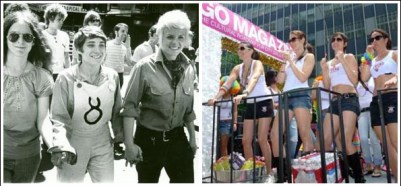
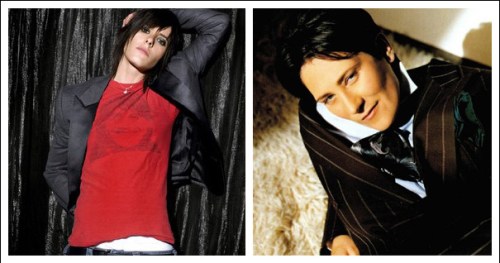
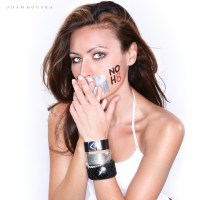
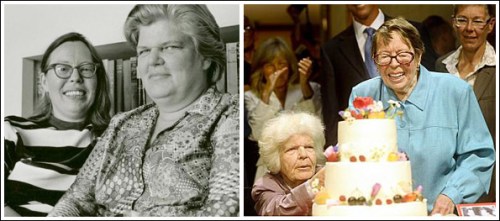
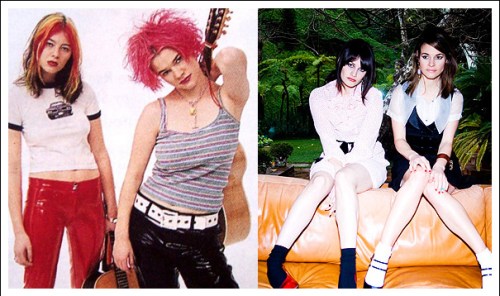
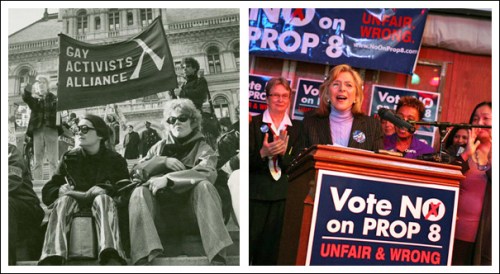
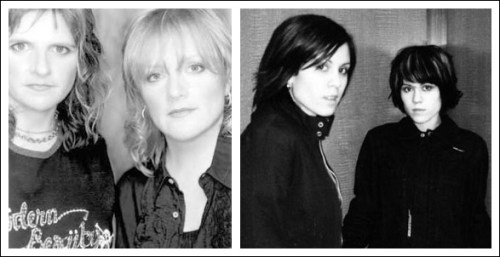
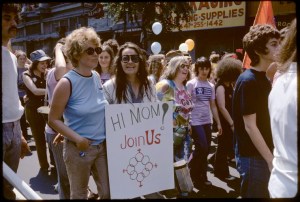
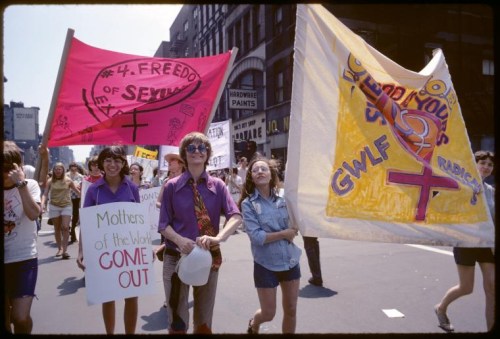

This was incredible. Really. Kudos to you all. I just finished up a little thing on the Lesbian Avengers last night (so this is all fresh in my mind) but the gender gap was the primary impetus in the group’s founding. These smart, powerful, lesbo activists were tired of playing second fiddle to the men who were leading the radical parts of the movement (i.e. ACT UP). Also, this age thing came up in my chat with the current (younger) Avengers. Interesting stuff. I guess I am an “older lesbian” having just turned 40 but I have no judgement directed at those younger than me or older. Every queer person has a different experience and every experience is worthwhile. Every act pushes us forward. Judging and patronizing are traps. We are so much stronger when we have each others’ backs. Now…join hands and sing kumbaya.
This is awesome: “Every queer person has a different experience and every experience is worthwhile. Every act pushes us forward. Judging and patronizing are traps.”
—
Yeah the one thing i learned in college about lesbians was via the women’s studies classes where we learned how the lesbians tried to ruin everything by trying to make everyone else a lesbian in order to REALLY fight the patriarchy, which was strange to me, and didn’t do much for my little closet. Also, Andrea Dworkin. Blergh to her.
Blergh indeed.
I want Tinkerbell to be a guest on the Chelsea Lately roundtable too. That dog makes some VERY good points.
I’ve also noticed a divide between my gay male vs. lesbian 20-something friends. Generally speaking, it does appear as though my lesbian friends are much more politically inclined (prop 8 rallys, seeking out blogs) where as my gay male friends really don’t take everything to heart as much and are just looking to have a good time.
You will find more republican gay men than lesbians due to stances on taxes, etc. I found that more gay men voted for McCain solely for this reason where as he was not an option for nearly all lesbians I know.
There are exceptions of course, but it seems to be the trend…. I wonder why this is?
Great article.
I’m loving this site; particularly the balance between high-quality content and unapologetic witty writing.
Also, it’s refreshing to see your (LGBTQ) site constantly link/reference other sites with similar causes.
thanks! we’re totally all about being a community with everyone online with everyone, since ultimately if we have the same goals, we’re absolutely all in it together. so thank you for noticing! and for the kind words. we truly love discussing these issues, as we are all total nerds.
This was really incredible. I’m glad Autostraddle is around, run by frickin’ intelligent women giving us a voice. #swineflu
me too. #swineflu #alternativelifestylehaircut #ichoochoochooseemilychoo
yes yes yes! more like this.
wish/command
I can’t say that I’ve really felt a generation gap between my queer/feminist friends and myself. Granted, my real life friends are mostly all my age (27) but also mostly straight, but my online friends run the gamut of ages and orientations and I feel like we are pretty much on the same page. But I also fee like in this day and age it’s easier to surround yourself (in any sphere) by like-minded people regardless of age, gender, location, etc. So now I’m talking in circles. What I mean to say is Yes. #alternativelifestylehaircut
Grace- nice BSG reference :)
Definitely a great roundtable. I don’t have much authority on this topic as I don’t yet know very many other gay people in general, but I really thought the idea that the gap was a result of a lack of education was true. I consider myself to be knowledgeable about the history of feminism and women’s lib, but I know very little about lesbian history.
I’ve seen this in my life, in a similar way as the two generations of feminism. I don’t *need* to blend in with mainstream hetero females, but dammit, I love the color pink and eyeshadow, ad nauseam. I want babies and a picket fence, too. The older ladies (both gay and straight) sometimes (but not always) want to crucify me for this.
yeah i feel like anyone who wants freedom should really want freedom. I mean i think that’s all there is to it.
I think people are scared that passing undermines the movement because it doesn’t implicitly enable visibility. But that’s assuming that eyeshadow & a picket fence is chosen in order to pass. I think in the past it often was chosen for that reason. But that’s changing … which ultimately makes the biggest impact of all. Like Grace said, the DOB originally formed with the intent of showing that we’re not all that different underneath it all …
I wish my mom knew Riese’s mom. Then maybe there would be one less gap.
‘Also who killed Dana Fairbanks & Jenny Schecter? Ilene Chaiken, also a lesbian. My point exactly. Don’t kill your own people.’
Ha haaaa, Tinkerbell, you crack me up you do
hello my scottish friend, this is tinkerbell. thank you for the complimentarys, i would never kill or even bite you. fight the power hear littlefoot roar! xoxo-tinkerbell
Great article.
I hate myself for not knowing more about these subjects. I try and educate myself about LGBTQ history but when I begin I just feel so overwhelmed I give up. However, I could probably draw you an accurate timeline of the Lohan/Ronson relationship (ouch riese, bang on)
I often feel ungrateful at the privilege that was fought for for me and my comparative ignorance about history that that so directly concerns me. My question is, where do I start?
That’s a good question, I guess that’s one of the things we’re trying to uncover the answer to — if there is one — and it can be overwhelming!
some easy places to start, IMHO: The Celluloid Closet (movie) and I actually really enjoyed this book called The Girls Next Door — I haven’t seen it written up anywhere and I think I found it at a used bookstore somewhere. It was written by two editors at Allure who are a couple, and they sort of travel around investigating all areas of lesbian life, like the Lesbian Avengers, the Michigan Womyn’s Music Festival, a Unitarian Universalist wedding, hung out with fancy golf pros at Dinah Shore, trailed the first out Seattle city councilwoman. They also interview a ton of people, and have really interesting things to say about gender, and lesbian life and lesbian sex (highlight: Susie Bright interview! She’s a good place to start too, w/r/t the pro-sex feminist camp).
— I haven’t seen it written up anywhere and I think I found it at a used bookstore somewhere. It was written by two editors at Allure who are a couple, and they sort of travel around investigating all areas of lesbian life, like the Lesbian Avengers, the Michigan Womyn’s Music Festival, a Unitarian Universalist wedding, hung out with fancy golf pros at Dinah Shore, trailed the first out Seattle city councilwoman. They also interview a ton of people, and have really interesting things to say about gender, and lesbian life and lesbian sex (highlight: Susie Bright interview! She’s a good place to start too, w/r/t the pro-sex feminist camp).
Sidenote I tried to read “Gender Trouble” and my head hurt real bad.
Speaking of LiLo and SamRo, I actually think they’re a legitimately important piece of our history. Changing the world for sure!
ha ha i’m going to read “gender trouble” in the near future and i’m afraid my head will explode, not because it is dense but because i have already read the summaries of said work and its criticisms, and i’m afraid i’m going to be even more annoyed at this stuff than i already am.
(full disclosure: i’m trained in the hard sciences and the law, and i’m a skeptical person in general.)
ok it’s 10:45pm and i have to write my article for tomorrow. gah! poop.
Yo! I’m a little nit-picky about these things, but that’s life. In the intro you mention that the ERA was passed in ’72 and then Riese’s mom points out that in fact it wasn’t…just a heads up! Oh, ERA, wherefore art thou??
This was great, however. I wish schools taught lesbian history just as they teach women’s history. Actually, I wish they taught both as they teach white male history. Maybe, MAYBE in time.
Y’all are awesome.
technically they’re both right. the ERA passed both houses of congress, but it was not ratified by enough states to be added to the constitution. so it passed but was ultimately defeated.
see and now i feel very educated. although now i am reading wikipedia and i am really confused about when, if ever, it actually was added to the constitution. if it never was/is, that would explain a lot.
In order for a constitutional amendment to be added (or removed) the act needs to pass with a 2/3 majority in each house of Congress and then ratified by 3/5 of the state legislatures (38 states). The ERA was passed in both houses of Congress, but only ratified by 35 of the required 38 states. It’s a complicated process, this is why in our 200+ history only 27 amendments have been made to the Constitution (and the first 10 are the bill of rights, and two are the Prohibition and its repeal.
—
Fun fact–one of the major sticking points that caused ERA to ultimately fail was the refusal of proponents to weaken or remove language regarding women on the front lines of combat. A Vietnam weary nation just didn’t think that was any place for a woman. Kind of interesting since today so many women are on the front lines in Iraq and Afghanistan.
haha I suppose this is true. I was taking it very literally.
We can all educate each other! I love the internets for this reason.
I think people used to call me Nicole-e-olee
Since it won’t nest anymore…did they call you Nicoleeolee Guacamole?
Because I get that all the time too.
ha no can’t say I have ever heard that one…
milk would cream tequila … good one tink
i fall into the poorly-educated category and i don’t know any lesbians over the age of 28, apparently. i’m going to go read a book.
wowowow thank you so much for this post.
i feel like this is a huge topic that that all too often gets pushed to the side (kind of like queer women in general, hm) because everyone’s so focused on what’s going on nownownow. i’m not sure if i could possibly gush over you guys any more without it starting to get embarrassing, so i won’t (until i’m drunk). anyway.
i feel like the (lesbian) generation gap is largely due to two things: the second/third wave feminism gap and the newer scene-ification of “queer.”
the sense that i’ve from among older lesbians is that they’ll identify as “woman” before “lesbian” because that’s the political climate that they grew up in. just being a woman was enough of a fight (not that this isn’t necessarily true now, hot riese, when can we talk feminism?), and with the second wave’s push toward a universal female identity and therefore also a push away from non-gender-conforming women, fighting for lesbian visibility wasn’t really possible.
that being said, those women accomplished a total mindblowing amount that’s allowing us to be the out, proud, autostraddling women we are today, and we should never ever forget that.
we are only what our past has allowed us to become, and to show our gratitude, we shouldn’t allow queerness or lesbianism to become an elitist scene. entirely too often i’ve seen my “radical” peers immediately blow a potential ally off because they didn’t understand some sort of obscure terminology known only by the “most progressive” of queers. this is a fight for all of us, and i think that we need to build a growing respect not only for our predecessors, but for each other, as no two experiences are really the same.
ps – whoa katrina, shut the fuck up!
No, don’t shut the fuck up. You make excellent points. Respect needs to go both ways.
i second vikki. *don’t* stfu! anyway, i’d like to highlight something you said:
“we shouldn’t allow queerness or lesbianism to become an elitist scene. entirely too often i’ve seen my ‘radical’ peers immediately blow a potential ally off because they didn’t understand some sort of obscure terminology known only by the ‘most progressive’ of queers.”
bingo. bingo. and oh yeah BINGO!
this is the exact type of elitism and smugness that initially spawned “stuff lesbians like” list on my site. (the list has taken on a different path, but i’d like to bring it back to the original goal at some point, i.e. to lampoon the pretension and obvious classism in the trendy pomo radical bla bla bla set.)
i feel like a small segment of lesbians have commandeered what is considered cool and trendy and acceptable, when “jane six pack” (ha ha i’m un-clever i know) – the majority of lesbians who didn’t have the money to study feminism/queer studies in small liberal arts colleges – just wants practical things… like her civil rights. i’m like, hey it’s cool that you had the privilege of taking unpaid internships in your feminist organizations and study subjects that aren’t seen as useful by those who hold the keys to the labor force (which is why the rest of us had to study other things, duh!), but it would be incredibly helpful if you could stop *yelling* at me to stop “aping the patriarchy” and other shit.
oh and by the way, to other folks who are with me on this – you can read the same stuff these folks read in college by getting them off of amazon.com. i’ve slogged through some of it in my spare time – and trust me, you’re not missing much. i think postmodernism and its spawn, like queer and gender theory, is highly overrated (and in fact downplays or even dismisses things like… well… science), but that’s another post for another time. :)
anyway, before i lose my train of thought. yes, if everyone could simply take a less dismissive tone towards others, people will be more willing to engage in dialogue.
yay for this roundtable! yay for spirited and respectful dialogue. yay for riese. yay for the interns. yay for my boss not yelling at me for taking over the one internet kiosk in the caseroom. yay all around!
and yay for Grace the Spot commenting/discussing on our roundtable – I love it!
omg i just got the t-shirts. THANKS!
Agreed with intern kc dangertina, vikki and grace (and obvs alex too!) The best way to assure we never close any gaps ever is for anyone to be scoffing at anyone for not knowing things they only had time to study ’cause they could afford it.
—
And I mean that was also one of the early conflicts within second-wave feminism, that many African-American women wanted it taken out of academia and the ivory tower and get past theory to actually address the serious realities of their lives — and similarly, poor women of all races didn’t feel the movement was about them either as they saw it as theoretical rather than practical. I guess I always felt like the reason some people study theory is because they will then be better equipped to apply it on the ground to mobilize change, so being superior & snobby about knowing the theory conflicts with it having any place or purpose whatsoever. It’s useless out of context, so we can’t afford to reject the context.
—
And yeah, it can all be learned in the library, I did. Well, actually you can buy most of these books on amazon used for like five cents. But when it comes to public high school, it’s unfortunate that we don’t get our three minutes aside from learning that lesbians tried to divide the feminist movement (I lived in a liberal school district where at least some basic ideas of feminism were discussed), just w/r/t the effects of symbolic anihilation in the classroom, which I can’t spell, which is why I’ll never write any theory ever.
—
Yay for the roundtable, spirited and respectful dialogue, interns, and your boss, and all our special guests!
i like these comments. i wanna keep you all. yes.
ALSO: RIESE’S MOM ?! so so much autowinning there.
love.
Riese, thanks for posing this question. LOVED Maureen’s words. Love them all, actually!
It’d be cool if the possible generation gap that may or may not exist is large enough to keep me from ever wanting to wear tube socks + velcro sandals.
This is my first time commenting, but I really enjoyed this article. Since you guys are revamping the site I suggest you have a new article dedicated to lesbian history (as most of the other things are about what is going on in the now). I honestly feel that my L history is very limited at this time, and I even took a Gay and Lesbian history course in my undergrad(haha)! I also really enjoyed this article because it brought in some different women to voice their opinion (loved MOR)!!
On a side note I just wanted to talk about Wasilla, AK as my girlfriend is currently living there (I am all the way on the southern hemisphere in NZ for a couple years) :) As a prior disclaimer I want to say I do not love S. Palin, and am really out of touch with her recent political actions. I do want to say that Wasilla does seem have a lesbian community and there are gay bars in Anchorage. Actually I went to college in Reno NV and it seems as if the L community in Wasilla has a larger variety. An example is a group that my girlfriend joined that was geared towards femmes of ages 21-35, they get together weekly to do various activities, this group also had other age ranges and there were other groups for other people. As my GF was new to the lesbian world at the age of 30 and a “femme” she found this group comforting. I again want to say that I am not talking about politics just giving props to the very very small town of Wasilla for having quite a large L community :)
AGREED. I think an L history section would be incredible, even just as a reminder that we have always been here. This site is already a fantastic resource, and that would make it even more so.
“Say you realize you’re gay at age 24… in a simplified situation all the sudden it’s like “Hey! I’m gay! What’s that mean? How do I tell people? Where the women at?” “Prop 8?? That’s me! WTF??” and you’re likely more focused on figuring out your sexuality and “the now” rather than the past.”
Ha! Change 24 to 35 and this is me entirely. I’ll catch up on the history… I admit that I had to wiki Lavender Menace … but I’ll get there. So much else to be thinking about, too, though!
Hello, is this thing on? I just stumbled onto this story, but I see that it’s a year old. I would love to see the conversation between the generations continue. At 51, count me among the elders!
The younger generation seems to focus on the stories and images provided by the mass media to a much greater extent than we did 30 yrs ago. Is that perception true, I wonder? When I rummage about this website, I am more entertained by the personalities, insights, outbursts and humor of the readers and writers than I am by the celebrities who seem to take up a lot of space around here.
Just keep being your sweet selves. You’re fabulous, you know.
There’s a gap, but I don’t know if it’s generational or informational. And sometimes I think it’s a gender gap. What? A gender gap among lesbians? Yeah. Butch and femme. Some lesbians are extremely dismissive of gender identity, butch identity and trans women.
Even though I agree that in some cases genderqueer lesbians subcategorize things to death, and yes it can be annoying, but that is no reason to throw the whole thing out like the Daughters of Bilitis did. (History repeating right here.) Yes, I understand there were dangers in the beginning and they had to be all secretive. As a rule you had to wear a skirt if you wanted to go to a DOB meeting. And when the Mattachine and the DOB got together to picket, the men wore suits and the ladies wore skirts so as to not appear too freakish. Trans women and butch dykes were not allowed…they were considered a problem. On top of that, feminists often felt drag queens to be an insulting caricature of womanhood.
I’m 33, and I came out in 1993 when I was 17. So I guess I’m sort of straddling the gap so to speak. I’m also genderqueer. When I was a teen, they just called that butch. But then there were arguments about how butch, soft butch, hard butch, stone butch, stud etc. But I’m perfectly comfortable just lumping it all together as genderqueer and beyond that gender becomes individual.
In the mid 90s the World Wide Web was just a baby. There wasn’t a lot of information on the web. There were message boards and chat rooms, but sometimes you needed a special code to get into them because they were so worried about men pretending to be lesbians in search of cybersex.
I didn’t live in a big city, so I didn’t know where to find my community. I just wanted to know where I came from, so I had to resort to books. And even I am sometimes surprised at how many queer books I have from the 90s.
Reading over them now, those books are very much like the blogs of today in book form. There’s lots of storytelling, narratives and reflections on the current state of things. It seems as though there were trying to preserve what they were doing and going through because previous generations had not been able to.
Today, thanks to the Internet, some of this has been corrected as I’ve found several archives of queer newsletters and ‘zines of the 70s online. You can also read the original firsthand reports of the Stonewall riots that appeared in the Village Voice. And those articles written the day after include dykes.
One of the benefits of publishing books instead of blogs, is that with the permanent nature of books there’s a greater emphasis on research and getting information right the first time. With blogs it seems like an online version of telephone where no one seems interested in going back and checking the original source.
So let me set the record straight. The Stonewall was a dump and the patrons were the most marginalized of the gay community. It wasn’t homofabulous. It was the queerist of the queer, drag queens, butch dykes and homeless queers. They were the ones excluded from the Mattachine Society and the Daughters of Bilitis with no where else to go. It was an illegal establishment not because it was owned by the Mafia, but because gay bars were illegal. They didn’t have a liquor license because they couldn’t get one. So the reliance on the Mafia was out of necessity.
Almost every firsthand account I have read mentions the dyke that started it all, a nameless stone butch that decided to resist arrest. The queens were on the side mocking the police as if there was nothing else they could do while their friends were getting arrested. Perhaps they were scared of the repercussions if they resisted. But this dyke kept slipping out of the patrol car. She wasn’t having it and the cops got more aggressive with her. That was the spark.
The Daughters of Bilitis and Mattachine Society started the Gay Rights Movement. Stonewall started the Queer Rights Movement. And this gap is what persists across generations.
I only discovered Autostraddle yday in my pursuit of anything Tegan and Sara [rock on girls!] related and I have to say, I’m hooked. The dedication to get your message out there, to be heard, to share your insights and to quote Crystal, get “totally geeked out” about things that are you important to you in an intelligent and witty manner; I’m not only going to continue coming back, I’ll also refer everyone I know, gay, straight, closeted, male, female, young and old, because this is one of the most informative and entertaining sites I’ve ever stumbled upon.
Now, having been introduced to the world of homosexuality late in high school [early 2000s] and emmersed in it ever since, more so in the last five yrs, I’ve only known members of the younger lesbian generation with the exception of an undergrad psychology teacher. And, in the time I’ve known these women, not once did any of them ever intimate that they took for granted the women that preceded us and they have accomplished.
I agree with many of these women who’ve spoken before me on different points. Generationally, there are always going to be gaps. Sure, sometimes educating yourself can help bridge some of these gaps but with age comes experience, with experience comes wisdom, and with wisdom comes the ability to teach those around you. I believe the gap lies in gender. Being a Chicana and an asexual one at that, I’ve had to deal with all sorts of discrimination. However, being a woman has always been the toughest, discrimination wise. People can only guess at my ethnicity but, can tell I’m a woman at first glance. Being a feminist has felt as normal as breathing. Like it or not, feminism, has long since the days of it’s inception, been associated with lesbianism. Because of this, so many women, young and old are afraid to be associated with feminism [even if they are hardcore feminists] because that will also associated them to homosexuality. Okay, so, I don’t want to step on my own words, I do think the gender gap is what is most prevelent but educating yourself and those around just the teensist bit will go a long way like, when you’re in you’re Psychology of sexuality class and the first thing your professor asks is “who here considers themself a feminst” and you’re the only person raising your hand, let the rest of the class [which, by the way, is made up of 20 or so females and the only progressive, straight, male in the school] that feminsm does not mean you’re a lesbian but, that you are pro women’s rights and you’ll have them all raising their hands when the prof asks the question again, once you’ve finished your rant. [true stroy]
Thanks Autostraddle, you rock socks!